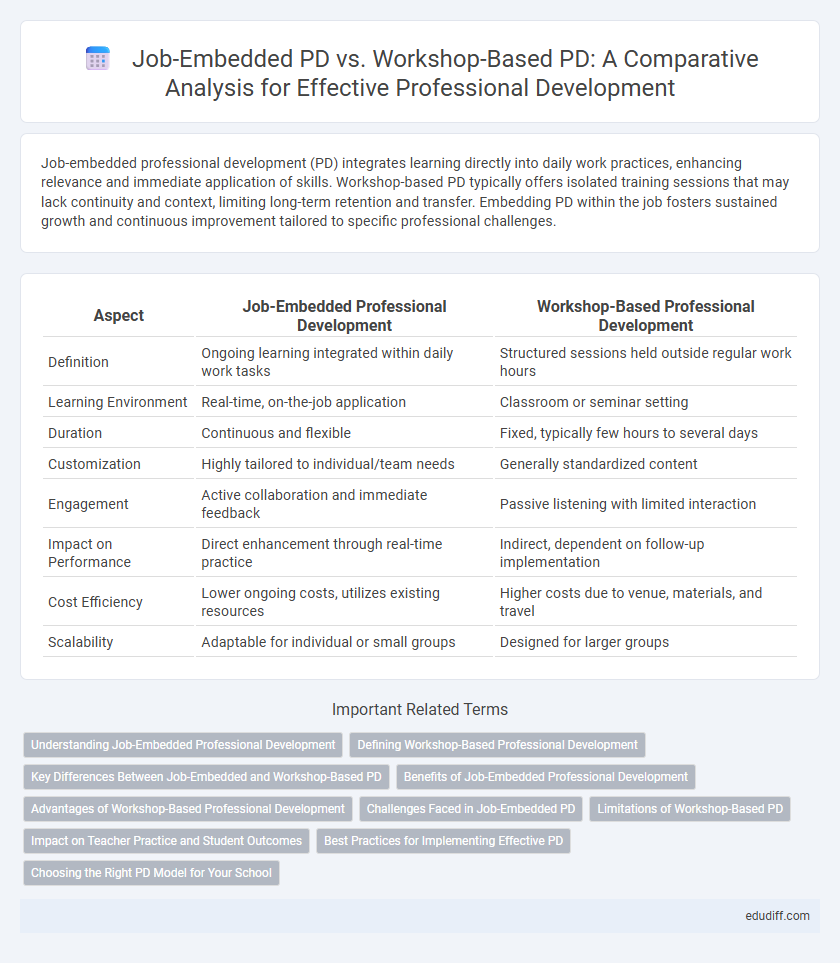Job-embedded professional development (PD) integrates learning directly into daily work practices, enhancing relevance and immediate application of skills. Workshop-based PD typically offers isolated training sessions that may lack continuity and context, limiting long-term retention and transfer. Embedding PD within the job fosters sustained growth and continuous improvement tailored to specific professional challenges.
Table of Comparison
| Aspect | Job-Embedded Professional Development | Workshop-Based Professional Development |
|---|---|---|
| Definition | Ongoing learning integrated within daily work tasks | Structured sessions held outside regular work hours |
| Learning Environment | Real-time, on-the-job application | Classroom or seminar setting |
| Duration | Continuous and flexible | Fixed, typically few hours to several days |
| Customization | Highly tailored to individual/team needs | Generally standardized content |
| Engagement | Active collaboration and immediate feedback | Passive listening with limited interaction |
| Impact on Performance | Direct enhancement through real-time practice | Indirect, dependent on follow-up implementation |
| Cost Efficiency | Lower ongoing costs, utilizes existing resources | Higher costs due to venue, materials, and travel |
| Scalability | Adaptable for individual or small groups | Designed for larger groups |
Understanding Job-Embedded Professional Development
Job-embedded professional development integrates learning directly into daily work activities, promoting continuous skill enhancement aligned with real-time challenges and classroom contexts. This approach contrasts with workshop-based PD, which often occurs in isolated sessions detached from immediate practice, limiting the transfer of new knowledge to actual job performance. Research highlights that job-embedded PD leads to higher teacher efficacy and improved student outcomes by fostering collaborative reflection and sustained support within the work environment.
Defining Workshop-Based Professional Development
Workshop-based professional development consists of structured training sessions conducted outside of the regular work environment, often lasting from a few hours to several days. These sessions focus on theory, strategies, and skills through presentations, group activities, and expert-led discussions. The format provides concentrated learning opportunities but may lack immediate application and contextual relevance compared to job-embedded professional development.
Key Differences Between Job-Embedded and Workshop-Based PD
Job-embedded professional development (PD) integrates learning directly into daily work activities, allowing educators to apply new strategies in real-time within their specific context, while workshop-based PD occurs as isolated sessions separate from classroom practice. Key differences include the continuous, collaborative nature of job-embedded PD versus the often one-off, generalized approach of workshops, which can limit immediate application and follow-up. Job-embedded PD fosters sustained improvement through ongoing support and reflection, enhancing teacher effectiveness more effectively than traditional workshop formats.
Benefits of Job-Embedded Professional Development
Job-embedded professional development enhances teacher performance by integrating learning directly into daily instructional activities, promoting real-time application and retention of skills. This approach fosters continuous growth through personalized feedback and collaboration with colleagues, leading to improved student outcomes. Unlike workshop-based PD, job-embedded PD ensures sustained engagement and relevance, aligning training closely with specific classroom challenges and institutional goals.
Advantages of Workshop-Based Professional Development
Workshop-based professional development offers structured, intensive learning experiences that foster immediate skill acquisition in a focused environment. These sessions provide access to expert facilitators and standardized content, ensuring consistent delivery of best practices across participants. The immersive setting encourages peer collaboration and networking opportunities, enhancing professional growth beyond individual skill sets.
Challenges Faced in Job-Embedded PD
Job-embedded professional development (PD) faces challenges such as balancing instructional time with training demands, limited access to immediate expert feedback, and variability in implementation fidelity across diverse classroom environments. Educators may struggle with integrating new strategies seamlessly into existing routines without disrupting student learning progress. Sustaining ongoing support and fostering collaborative culture among staff are critical for overcoming resistance and ensuring meaningful, context-specific growth.
Limitations of Workshop-Based PD
Workshop-based professional development often lacks sustained engagement, limiting long-term skill retention and application in real work settings. This approach typically provides generalized content that may not address specific contextual challenges or individual learner needs. The absence of ongoing support and feedback further constrains its effectiveness compared to job-embedded professional development models.
Impact on Teacher Practice and Student Outcomes
Job-embedded professional development integrates learning directly into daily teaching activities, promoting sustained changes in instructional strategies and yielding measurable improvements in student achievement. Workshop-based professional development offers concentrated, short-term skill acquisition but often lacks follow-up support, limiting long-term impact on teacher practice. Research consistently shows that job-embedded PD enhances teacher collaboration and reflection, leading to deeper implementation of best practices and higher student performance.
Best Practices for Implementing Effective PD
Job-embedded professional development (PD) enhances educator growth by integrating learning directly into daily teaching practices, promoting continuous reflection and application of new strategies. Workshop-based PD often isolates learning from the classroom environment, limiting immediate implementation and sustained impact on instructional quality. Best practices for effective PD emphasize ongoing coaching, collaborative learning communities, and data-driven feedback, ensuring alignment with educators' needs and school goals for measurable student outcomes.
Choosing the Right PD Model for Your School
Job-embedded professional development (PD) integrates learning within the daily routines of educators, fostering continuous improvement and relevance to specific teaching contexts, whereas workshop-based PD offers concentrated, time-limited training sessions often removed from classroom realities. Choosing the right PD model for your school depends on factors such as teacher collaboration needs, resource availability, and the goal of sustained instructional change. Schools prioritizing long-term, context-driven growth benefit more from job-embedded PD, while those seeking immediate skill updates might find workshop-based PD more practical.
Job-embedded PD vs Workshop-based PD Infographic

 edudiff.com
edudiff.com